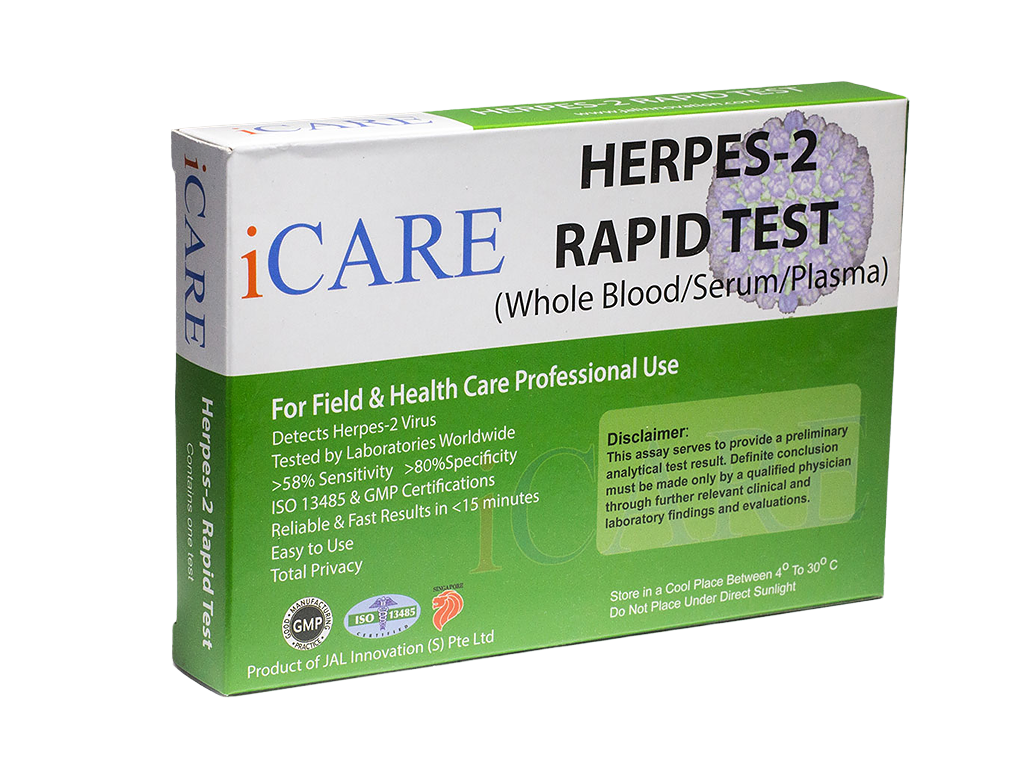Table of Contents
Herpes Simplex Virus type 2 (HSV-2) is one of the most common sexually transmitted infections (STIs) globally, yet it remains significantly underdiagnosed in many parts of the world, especially in developing nations. This virus is a leading cause of genital herpes, which often goes undetected because many individuals have mild or no symptoms at all. In many developing countries, the lack of infrastructure for diagnostics and healthcare delivery makes controlling the spread of HSV-2 a major challenge.
Integrating Herpes Simplex Virus 2 Test Kits, into national STI control programs offers a practical and effective solution. These kits provide a cost-effective and accessible method for early diagnosis, allowing individuals to get tested and treated before the virus spreads further. The use of Herpes Simplex Test Kits can dramatically improve the management and control of HSV-2 in developing nations where resources are limited.
In this article, we will explore why HSV-2 test kits should be integrated into STI control programs in developing nations, focusing on specific countries and cities that could greatly benefit from this approach.
The Need for HSV-2 Test Kits in Developing Nations
In developing countries, the burden of sexually transmitted infections (STIs) is high, yet diagnostic access remains limited. HSV-2, in particular, poses a unique challenge due to its asymptomatic nature in many individuals and its potential for long-term complications, including an increased risk of HIV transmission. The lack of widespread testing for HSV-2 in many low- and middle-income countries means that individuals with the virus may unknowingly transmit it, further exacerbating the problem.
Many developing nations face challenges such as:

- Lack of Access to Diagnostic Services: In rural and remote areas, traditional diagnostic services for HSV-2, such as blood tests and laboratory-based PCR tests, are often unavailable due to limited infrastructure.
- Delayed Diagnosis: Without proper testing, people may not get diagnosed until complications arise, leading to higher rates of transmission.
- Stigma and Lack of Awareness: Cultural stigma and low awareness around HSV-2 often prevent individuals from seeking testing and treatment.
These kits are easy to use, provide quick results and can be distributed widely, ensuring more individuals receive the diagnostic services they need.
Key Developing Nations and Their Cities That Would Benefit from HSV-2 Test Kits
Certain countries, particularly those in Asia, Africa and Central America, face higher rates of STI transmission. Integrating Herpes Simplex Virus 2 Test Kits into their national STI control programs can significantly improve early detection, treatment and ultimately control the spread of HSV-2.
Here are some developing nations and their cities that would benefit from the integration of HSV-2 test kits into their national health systems:
Laos
Laos, like many Southeast Asian countries, faces significant challenges in healthcare infrastructure, especially in rural and remote regions. With limited access to specialized diagnostic services for STIs, introducing HSV-2 home test kits could help in early detection, particularly in cities like Vientiane and Savannakhet, which have growing populations but limited healthcare resources. By introducing rapid testing kits in these urban areas, Laos can reduce the stigma surrounding HSV-2 while also improving accessibility to testing.

Uzbekistan
Uzbekistan, with its central location in Central Asia, is experiencing growing concerns over STIs. The healthcare infrastructure is gradually improving, but rural regions still lack access to the necessary diagnostic resources. Integrating Herpes Simplex Virus 2 Antibody Test Kits in Tashkent and other large cities can help reduce transmission rates. Urban centers like Samarkand and Bukhara would benefit from HSV-2 rapid test kits, ensuring more people are diagnosed and treated in a timely manner.
Turkmenistan
In Turkmenistan, healthcare is concentrated in urban areas, with rural areas still underserved. The lack of diagnostic services, particularly for STIs like HSV-2, means many people go undiagnosed and untreated. Integrating HSV 2 Test Kits in Ashgabat and other urban hubs can allow for easier access to testing, helping to curb the spread of HSV-2. Turkmenabat and Mary are key locations where national health programs could leverage home-based testing kits to increase early detection.
Dominican Republic
The Dominican Republic has a high prevalence of sexually transmitted infections, including HSV-2. In both urban and rural regions, access to healthcare services is uneven, with rural areas experiencing lower levels of healthcare access. By incorporating HSV Test Kits into national STI programs, cities like Santo Domingo and Santiago can make testing more accessible. Additionally, mobile health initiatives could bring home herpes tests to more remote regions like La Romana and Puerto Plata.
Grenada
Grenada, a small Caribbean island nation, faces significant health disparities, with healthcare services being concentrated in urban centers. St. George’s, the capital city, could greatly benefit from the integration of Herpes Simplex Virus 2 Test Kits into national STI control programs. With a relatively small population, Grenada could implement rapid testing and increase public awareness about HSV-2, reducing the stigma surrounding the virus and improving early diagnosis.
The Impact of HSV-2 Test Kits on National STI Control Programs
Integrating HSV-2 test kits into national STI control programs can have a profound impact on public health, especially in developing nations where STI control is often a low priority. These test kits provide rapid and accurate results, ensuring that individuals who may be unaware of their infection can receive timely treatment.

Key Benefits of HSV-2 Test Kits in STI Control Programs:
- Early Detection and Treatment: With early testing, individuals can receive appropriate treatment, preventing further transmission of the virus and reducing complications such as recurrent outbreaks and increased susceptibility to HIV.
- Wider Accessibility: By providing HSV 2 Test Kits in a range of settings – mobile clinics, pharmacies and through community outreach – more people in underserved areas can access testing without having to travel long distances to health facilities.
- Cost-Effective: These rapid test kits are affordable, especially when compared to traditional diagnostic methods, making them suitable for national health programs in developing countries with limited budgets.
- Reduced Stigma: Offering home herpes tests helps to reduce the stigma associated with HSV-2 by allowing individuals to test in private, which can encourage more people to seek testing and treatment.
- Improved Public Health Outcomes: As more people are diagnosed and treated for HSV-2, overall public health outcomes will improve. This reduction in untreated cases will lower transmission rates and help break the cycle of infection in the population.
Conclusion
The integration of Herpes Simplex Virus 2 Test Kits into national STI control programs in developing nations can significantly improve the early detection and management of HSV-2. By providing affordable, accessible and rapid testing options, countries like Laos, Uzbekistan, Turkmenistan, Dominican Republic and Grenada can reduce the burden of this common STI. These test kits can play a key role in breaking the cycle of transmission, improving public health outcomes and helping individuals receive the treatment they need before complications arise.
As HSV-2 home test kits continue to evolve, their integration into national STI control programs will be vital in ensuring that developing nations can effectively manage and control the spread of HSV-2, benefiting public health on a global scale.
FAQs on Herpes Simplex Virus 2 Test Kits
Why Herpes Simplex Virus 2 Test Kits Should Be Integrated into National STI Control Programs in Developing Nations?
What is an HSV-2 Home Test Kit?
An HSV-2 Home Test Kit is a diagnostic tool that allows individuals to test for the presence of Herpes Simplex Virus 2 (HSV-2) antibodies or antigens in the comfort of their own home.
How accurate are HSV-2 Test Kits?
HSV-2 Test Kits are highly accurate, especially when used correctly. They are designed to detect the presence of the virus at an early stage and most kits offer high sensitivity and specificity.
Can HSV-2 Test Kits be used in rural areas?
Yes, HSV-2 Test Kits are ideal for use in rural areas due to their portability and ease of use. These kits can be distributed through mobile clinics, pharmacies and other healthcare channels in remote regions.
Why is integrating HSV-2 Test Kits important for national STI control programs?
Integrating HSV-2 Test Kits into national STI control programs allows for early detection and treatment, reducing transmission rates and improving public health outcomes. It also makes testing more accessible to underserved populations.
How can I obtain an HSV-2 Test Kit?
HSV-2 Test Kits are available at pharmacies, through online retailers and can be distributed through healthcare programs in developing nations. Individuals can also obtain these kits through local health clinics or community outreach programs.






